Porthcawl: Sewage overflows call after beach closures
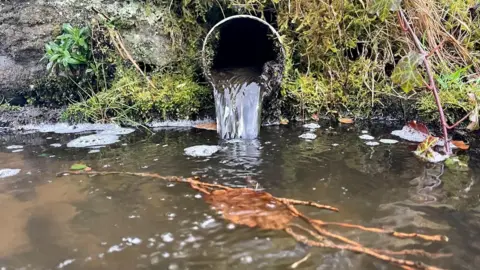 BBC
BBCWater companies and the Welsh government have a duty to protect public health from sewage overflows, campaigners have said.
Untreated sewage flowed into the sea last week, causing the closure of two beaches at Porthcawl, Bridgend county.
Welsh Water said having two incidents on the wettest day since May showed the system was getting better.
The Welsh government said it has committed £40m to improve the situation over the next three years.
But campaigners said that was not good enough.
"This is people's lives you know: it's frightening," Wendy Broom, a co-founder of the cold water swimming group Newton Buoyant Bluetits told BBC Radio Wales.
Ms Broom said her group of swimmers learned about the closures only when another campaign group, Surfers Against Sewage, got in touch.
"It's all voluntary and this is about a duty of care to public health," she said, "The whole system just needs tightening up and being much more assertive."
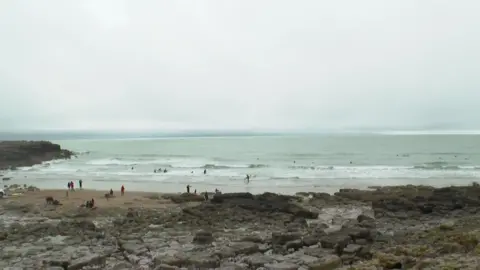
Welsh Water is currently consulting on a 25-year plan to prevent combined sewer overflows (CSOs), where sewage is released into the environment to prevent it from backing up into peoples' homes.
"We want this all to stop and Welsh Water needs to raise the profile of that plan so we can increase engagement with interested groups like surfers and swimmers," Ms Broom said.
She said the problem was the cost: an estimated £9bn-14bn to upgrade Wales's ageing sewer system.
"It's going to take time... however, somehow or other this is really crucial that this gets resolved," she said. "There is this duty of care for public health."
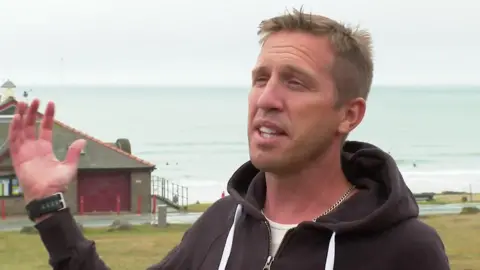
Surfer and author Tom Anderson said the argument that it was either pumping it into the sea or back into houses was "a trick".
"There is a third option and that is to spend money on our sewage infrastructure," he said.
"Finding out that the first waves in weeks were accompanied by a flotilla of sewage, it put a lot of people off, it was a really unpleasant idea," he added. "There were people posting photographs of all sorts of disgusting-looking sludges on the shoreline and most people stayed (away), which is something I haven't seen since the coronavirus."
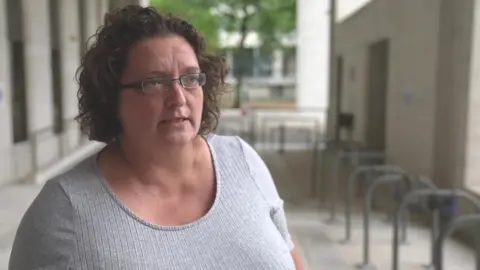
Gail Davies-Welsh, chief executive of Afonydd Cymru, a charity which campaigns for clean rivers in Wales, said the CSOs are only part of the problem.
Recent reporting on phosphate compliance in Special Areas of Conservation rivers in Wales showed that CSOs contribute only 2-3% of phosphate, she said.
Damaging plant and animal life
"That's because there is a far greater impact from agricultural discharges and pollution and also waste water treatment works discharges," Ms Davies-Welsh said.
Phosphates are naturally occurring minerals found in human and animal waste.
They are vital for plant growth but at high concentrations in water bodies, phosphates can cause dramatic growth of algae, which leads to depleted oxygen levels, damaging aquatic plant and animal life.
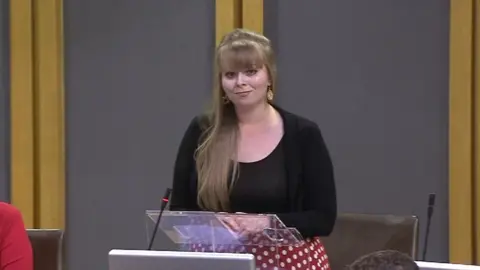
The Senedd's environment committee is among those calling for action.
Delyth Jewell, the Plaid Cymru MS for South Wales East, who sits on the committee, called it a "disgusting situation".
"That obviously is going to be having a terrible impact on the environment, but also on environmental health, public health. People are afraid to go swimming in the sea because they've worried about sewage."


- THE WORLDS MOST EXPENSIVE SHEEPDOGS: In demand all over the world
- RESCUING DAD: Dai Chant returns to the sea after 30 years

Analysis by environment correspondent Steffan Messenger:
Dwr Cymru Welsh Water argues that it has invested heavily in recent years - including in a monitoring system on its storm overflows so that data on spills is recorded and shared.
The debate around this is slightly different in Wales too because it's a not-for-profit water company, unlike its English counterparts.
Having said that, there's no doubt that the idea of CSOs being used infrequently as a last resort in extreme weather to stop sewage flooding our homes is being challenged by climate change.
There were over 100,000 incidents in Wales in 2020 alone so calls for action will continue to grow.
The Welsh government set up a task force on the issue, which reported its initial plan last month.
Accepting that a multi-billion pound overhaul of our sewage system is unaffordable, it places a heavy emphasis on investing in so-called nature-based solutions. These would capture rainwater and slow its flow into sewers so they are overwhelmed less often.

The Welsh government said it had committed £40m to improving the situation over the next three years and established a new task force, set to publish recommendations for action on CSOs imminently.
In a statement, Dwr Cymru Welsh Water emphasised that some parts of south Wales saw their wettest day since May last Tuesday.
Despite this, only two CSOs spilled into designated bathing waters. This is what they're designed to do, the company said, adding that the spills were compliant with their environmental permits.
